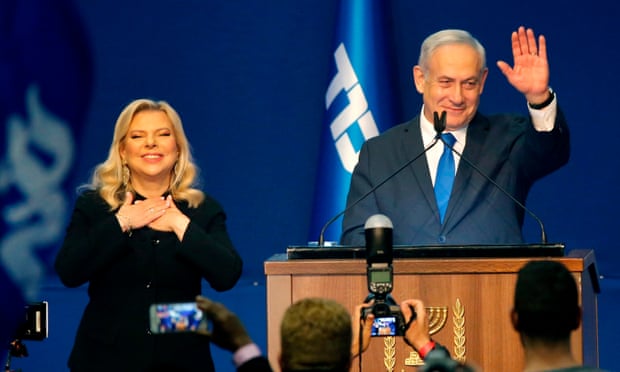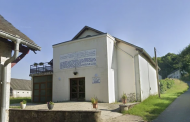Benjamin Netanyahu has claimed victory in Israel’s third election within a year, even as the country looked set for further political deadlock after early counts suggested he was still short of securing a historic fifth term.
By Tuesday morning, with 90% of the votes counted, the prime minister’s Likud party appeared to be ahead with 36 seats, with a total of 59 for his rightwing alliance.
Critically, he was just two seats shy of a 61-seat parliamentary majority and, if the final tally remains the same, would only be able to form a government in the coming weeks by enticing rival politicians to join him.
Regardless, the result was a stunning turnaround for a man two weeks away from the start of a major criminal corruption trial. He is expected to appear in a Jerusalem court on 17 March on charges of bribery, fraud and breach of trust in three major cases.
His main opponent, retired general Benny Gantz and his Blue and White party, took 32 seats, partial results showed.
Meanwhile, politicians representing the country’s sizeable Arab minority appeared to be set for significant gains. The Joint List alliance have been calling for people to vote for them as a protest against Netanyahu’s racist campaigns. Early counts showed the party had up to 17 seats, making it the third largest party in the Knesset by a clear margin.
In the early hours of Tuesday morning at a rowdy election party in Tel Aviv, Netanyahu told cheering crowds waving blue flags that his “victory” was sweeter than the first time he became prime minister in 1996 because it was harder.
“We stood in front of strong forces. They told us we are going to lose, that it was the end of the Netanyahu era,” he said. “We turned lemons into lemonade.”
Responding to the results, Husam Zomlot, the Palestinian envoy to the UK, said Israeli voters had “rewarded hate, corruption and the promise to annex the occupied territories”, referring to Netanyahu’s recent promises to take more Palestinian land.
Gantz had focused his campaign on Netanyahu’s alleged corruption and anti-democratic moves. The strategy appears to have failed three times.
At the Blue and White election party, the room soon emptied as rumours started to spread of a potentially disastrous result. “We are not beating around the bush and not telling ourselves stories: I share the sense of pain and of disappointment,” Gantz said.
There were concerns before voting day that coronavirus fears and election fatigue would hit turnout. Those were quickly dispelled as officials showed 68% of the electorate – more than the previous two elections – had voted.
Authorities had even set up separate polling stations made of plastic sheeting for the more than 5,500 Israelis who were under precautionary home isolation after returning from areas of the world affected by coronavirus.
Israel has been in an extended state of political crisis for almost 12 months after two previous general elections failed to produce a clear winner. To break the deadlock, Netanyahu had sought to energise his hardline nationalist base with promises of land grabs from Palestinians.
A week ago, he announced he would go ahead with a highly controversial plan to build settlements east of Jerusalem. The plan would almost completely encircle Palestinian neighbourhoods in the holy city.
Netanyahu made similar appeals before the previous votes. In April, he said he would annex all current settlements, and in September he promised to go further, by claiming sovereignty over a third of the entire West Bank.
He has also looked to his rightwing global ally, Donald Trump, to help him convince Israelis that he is the only leader able to garner concessions from world powers.
In late January, the US president appeared to give Netanyahu just that, revealing a “vision for peace” plan in the White House that read like a checklist of demands from the Israeli far right. The Palestinian leadership rejected the plan as flagrantly biased.
For Netanyahu, days or weeks of deal-making are now expected. If he fails, a fourth election could be called.
Israel’s left-leaning Zionist parties, including the once dominant Labour, who have largely lost support during the three elections.
Fearing it might not garner enough votes to even pass the threshold to make it into the Knesset, Labour merged with the centrist Gesher party. It also made a deal with the the anti-occupation Meretz party, which was itself accused of watering down its message by allying with less progressive politicians. The three-party alliance appeared to win just seven seats on Monday.
At a Jerusalem polling booth, Shoshi Feld, who works for a children’s theatre, said she would vote for the alliance, but felt despondent.
“It’s the least worst option,” she said.








































admin in: How the Muslim Brotherhood betrayed Saudi Arabia?
Great article with insight ...
https://www.viagrapascherfr.com/achat-sildenafil-pfizer-tarif/ in: Cross-region cooperation between anti-terrorism agencies needed
Hello there, just became aware of your blog through Google, and found ...